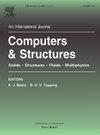Adaptive isogeometric topology optimization of shell structures based on PHT-splines
IF 4.4
2区 工程技术
Q1 COMPUTER SCIENCE, INTERDISCIPLINARY APPLICATIONS
引用次数: 0
Abstract
This paper proposes an adaptive isogeometric topology optimization framework for shell structures by utilizing a continuous density field represented as Polynomial splines over Hierarchical T-meshes (PHT-splines). This framework ensures an exact representation of shell structures, eliminating the geometric inaccuracies commonly associated with topology optimization. In the meanwhile, the meshes used for design and analysis are refined adaptively and locally along the density boundary to achieve a smooth material layout with reduced degrees of freedom (DOF). The adaptive sensitivity filter is tailored to the characteristics of PHT-splines, where the filter radius is determined automatically and adaptively, without the need to specify parameters in advance. Numerical experiments conducted on various shell structures validate the efficacy of the proposed adaptive framework. In comparison with isogeometric topology optimization based on non-adaptive cases (i.e. B-splines), the proposed adaptive framework demonstrates a notable enhancement in computational efficiency, with a reduction in running time and a reduction in DOF. Additionally, we offer a detailed comparison between PHT-splines and other locally refinable splines in the context of shell topology optimization. Numerical experiments exhibit that the efficient and localized refinement capability of PHT-splines provides advantages in both computational efficiency and structural performance for topology optimization.
基于 PHT-样条线的壳体结构自适应等值拓扑优化
本文提出了一种针对壳体结构的自适应等距拓扑优化框架,利用分层 T 型网格上的多项式样条(PHT-样条)来表示连续密度场。该框架确保了壳结构的精确表示,消除了拓扑优化中常见的几何误差。同时,用于设计和分析的网格会沿着密度边界自适应地局部细化,以实现平滑的材料布局,减少自由度(DOF)。自适应灵敏度滤波器是根据 PHT-样条曲线的特性量身定制的,滤波器半径是自动自适应确定的,无需事先指定参数。在各种壳体结构上进行的数值实验验证了所提出的自适应框架的有效性。与基于非自适应情况(即 B-样条曲线)的等几何拓扑优化相比,所提出的自适应框架显著提高了计算效率,运行时间减少了 50%-80%,DOF 减少了 30%-60%。此外,我们还详细比较了 PHT 样条曲线和其他局部可细化样条曲线在壳体拓扑优化中的应用。数值实验表明,PHT 样条的高效局部细化能力为拓扑优化提供了计算效率和结构性能方面的优势。
本文章由计算机程序翻译,如有差异,请以英文原文为准。
求助全文
约1分钟内获得全文
求助全文
来源期刊

Computers & Structures
工程技术-工程:土木
CiteScore
8.80
自引率
6.40%
发文量
122
审稿时长
33 days
期刊介绍:
Computers & Structures publishes advances in the development and use of computational methods for the solution of problems in engineering and the sciences. The range of appropriate contributions is wide, and includes papers on establishing appropriate mathematical models and their numerical solution in all areas of mechanics. The journal also includes articles that present a substantial review of a field in the topics of the journal.
 求助内容:
求助内容: 应助结果提醒方式:
应助结果提醒方式:


